
The 32nd Annual Canadian Conference on HIV/AIDS Research (CAHR) “A Boomerang Effect: From HIV to SARS-CoV2 and Back again” was held in Quebec City in April of this year. It’s the premier gathering in Canada for those working in the field of HIV, along with policy makers, persons living with HIV and other individuals committed to ending the pandemic.
Two members of PAN’s Research and Evaluation team were able to attend the conference: Jennifer Demchuk (PAN Manager of Research and Evaluation) and Courtney Tizya (Making it Work Study Research Trainee). Although the conference agenda was packed with thought provoking keynote presentations, and over 300 abstracts shared via poster and oral presentations, there were a few that stood out for our team.
Courtney reflected on her experience at CAHR, noting it “was my first big research conference. I was amazed at the size of the conference, and how much passion the presenters and researchers clearly felt for their work. Our team presented on day one and I was not entirely sure what to expect. Our Making it Work presentation was open to the entire event and was specifically encouraged for any attendees who work with Indigenous people living with HIV. Alongside a presentation by Sherri Pooyak of the AHA Centre at CAAN (Communities, Alliances and Networks) our session focused on how to do research in a good way with Indigenous communities. Leading up to the presentation our team was incredibly busy, but we managed to bring everything together quite nicely. I am grateful to Jennifer Demchuk and Sherri Pooyak who presented with me. Sherri took the lead on the presentation and there were lots of great questions. It was nice to see several folks come to the presentation so that they could reflect upon their own research and ask the team some questions they had for their specific projects. We also had the good fortune of seeing many friendly faces from PAN, CAAN, and the AHA centre.”
Here are some of the keynotes, presentations, poster and oral abstracts that stood out to us.
Taking Strides in the Testing Technology Landscape
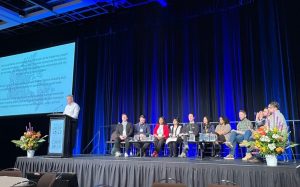 A conversation that was woven throughout the conference and many presentations was the changing landscape of self-testing technologies in Canada and appropriate linkages to care. Dried blood spot (DBS) testing, pharmacy-based models for testing, and various self-testing programs for sexually transmitted blood-borne infections (STBBIs) were all discussed.
A conversation that was woven throughout the conference and many presentations was the changing landscape of self-testing technologies in Canada and appropriate linkages to care. Dried blood spot (DBS) testing, pharmacy-based models for testing, and various self-testing programs for sexually transmitted blood-borne infections (STBBIs) were all discussed.
A particular highlight was a symposium developed by REACH Nexus and moderated by Dr. Sean Rourke titled “National Implementation and scale-up of HIV self-testing to reach the undiagnosed in Canada – a coordinated community-based response to engage and support all affected key populations.”
The symposium held a spotlight on REACH Nexus’ Community Link program, the distribution of 200,000 free HIV self-test kits through community-based organizations to reach key populations in Canada. It featured community “champions” from organizations across the country that had the opportunity to explain their successes and challenges with the program thus far. The program also includes a national inventory and evaluation platform in “real-time” to support the distribution and effectiveness of the program.
As Jennifer reflected, “it became very apparent that the importance lies in communities, especially those that have been traditionally hard to reach, being able to speak to what their needs are, co-design solutions that will work for them, and being provided access to the services they need. Access to safe, secure, and confidential testing is only the first step.”
The CHIWOS-PAW Study “Health and Wellbeing of Indigenous Women Living with HIV”
This study used Two-eyed seeing to weave together Traditional Ways of Knowing and Western learning to support HIV care using arts-based research methods, Indigenous teachings and ceremony, along with sharing circles. For one year, the Wise Women (participants) were asked over multiple gatherings about their perspectives and understandings of their health and health care. The presenters, Elder Valerie Nicholson and Amber Campbell, reflected that the process was healing for the Wise Women who participated and for the research team. In the end, the team and Wise Women developed an Indigenous arts and strengths-based knowledge translation strategy to support positive actions and meaningful relationships with health care providers. This was a beautiful example of working with Indigenous peoples in a good way.
Lessons learned from the study were presented representing four categories:
- How is Health and Well-Being a Journey?
- How is Health Connected with Traditional Medicine & Ceremony?
- Why are Meaningful Relationships and Community Important?, and
- How are Healing Health Partnerships Built?
The PDF versions of the posters can be found here.
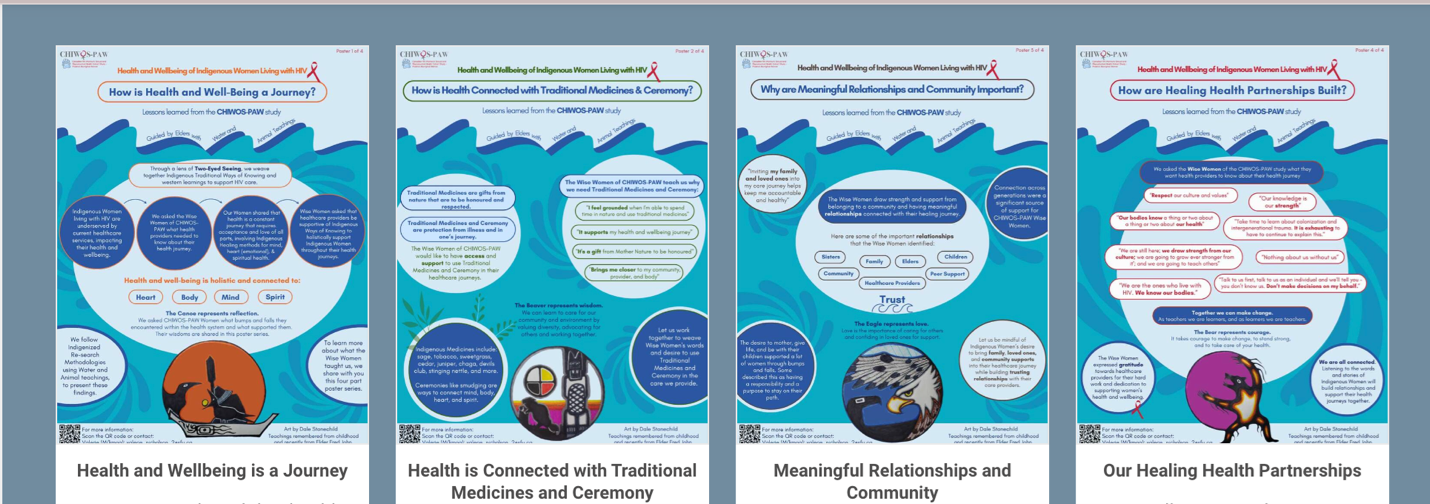
FOXY and SMASH Programs
 FOXY/SMASH is an arts-based not-for-profit sexual education and peer leadership organization in Northern Canada using a mixed methods study through land-based retreats to address why certain public health programs create sustainable change. Fostering Open eXpression among Youth (FOXY), provides a safe space for northern youth to learn about sexual health, sexuality, and healthy relationships in the Arctic. FOXY uses traditional beading, theatre, photography, and other art forms to help teens learn and express any questions, thoughts, or knowledge they may have around health and relationships. Strength, Masculinities And Sexual Health (SMASH) is a similar program designed specifically for young men in the Northwest Territories (and now the Yukon/ Nunavut).
FOXY/SMASH is an arts-based not-for-profit sexual education and peer leadership organization in Northern Canada using a mixed methods study through land-based retreats to address why certain public health programs create sustainable change. Fostering Open eXpression among Youth (FOXY), provides a safe space for northern youth to learn about sexual health, sexuality, and healthy relationships in the Arctic. FOXY uses traditional beading, theatre, photography, and other art forms to help teens learn and express any questions, thoughts, or knowledge they may have around health and relationships. Strength, Masculinities And Sexual Health (SMASH) is a similar program designed specifically for young men in the Northwest Territories (and now the Yukon/ Nunavut). 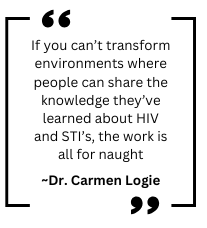 SMASH teaches sexual health, consent, healthy relationships, and positive masculinity while encouraging young men to define their own masculinity.
SMASH teaches sexual health, consent, healthy relationships, and positive masculinity while encouraging young men to define their own masculinity.
The research team conducted pre and post-test surveys with youth aged 12-19 years who were participating in FOXY and SMASH. The results demonstrate higher HIV/ STI knowledge, higher self-esteem, and higher safer sex self-efficacy.
As a Gwich’in woman, Courtney stated that she “found this presentation particularly moving because they are bringing their good work all over the North, including with Gwich’in youth who may have less access to sexual health programming.” There are some great Gwich’in videos about consent that can be found on the FOXY website.
Strength in Numbers: Establishing a Global Network of Older People with HIV
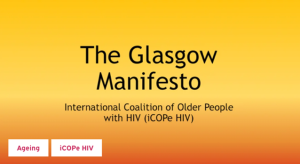 At AIDS 2022 in Montreal, Canada, the first face to face networking zone was held for ageing and older PLWH, a grassroots network was established with representatives from four civil society organizations. The network is known as the International Coalition of Older People Living with HIV (iCOPe HIV). This network’s first collaborative undertaking was to launch the Glasgow Manifesto, a call to action by ageing and older PLWH along with their allies. The manifesto begins by describing the urgent need to adapt HIV responses to better address the challenges faced by older PLWH. Stakeholders are called upon to implement 10 actions across the three domains of care, quality of life, and empowerment.
At AIDS 2022 in Montreal, Canada, the first face to face networking zone was held for ageing and older PLWH, a grassroots network was established with representatives from four civil society organizations. The network is known as the International Coalition of Older People Living with HIV (iCOPe HIV). This network’s first collaborative undertaking was to launch the Glasgow Manifesto, a call to action by ageing and older PLWH along with their allies. The manifesto begins by describing the urgent need to adapt HIV responses to better address the challenges faced by older PLWH. Stakeholders are called upon to implement 10 actions across the three domains of care, quality of life, and empowerment.
Courtney commented, “This oral abstract stood out to me when I heard that, in the global north, close to 40% of PLWH will be 60 or older within the next decade. Yet, despite the strength of this population, there is a gap in acknowledgement of their unmet physical, mental, social, and financial needs by peers, community-based organizations, health care providers, policy makers, and global HIV response leaders.”
Between Worlds: Female-Identifying Diaspora Middle Eastern and North African Women in Ontario on the Intersections of Gender, Sexuality and Sexual Health (YSMENA community-based research study)
YSMENA community-based research study focused on sex and sexual health practices of Middle Eastern and North African (MENA) youth in Canada by identifying key determinants driving how MENA diaspora youth living in Ontario access sexual health and HIV prevention interventions. It is the first 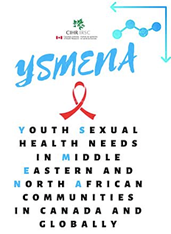 community-based research program in Canada to center the voices of diaspora MENA youth, “Our goal is to capture the diverse voices of MENA youth across Canada from various communities, including youth who use drugs, gay and bisexual cis men who have sex with men (MSM), transgender youth, cis lesbian and bisexual women, cis heterosexual women and men, and youth from newcomer and refugee communities.”
community-based research program in Canada to center the voices of diaspora MENA youth, “Our goal is to capture the diverse voices of MENA youth across Canada from various communities, including youth who use drugs, gay and bisexual cis men who have sex with men (MSM), transgender youth, cis lesbian and bisexual women, cis heterosexual women and men, and youth from newcomer and refugee communities.”
The study, which used a mixed-methods design, gathered quantitative socio-demographic surveys along with six focus groups for rich qualitative data. Some themes that came up within the focus groups were pressures to conform to family expectations and barriers when accessing health care, sexual health and HIV prevention services. The study findings can support sexual health programming to be more inclusive and culturally relevant. The findings also offer recommendations for health care practitioners and service providers from the MENA youth.
“This stood out for me because this community is under-researched despite rising immigration rates. The presenter, Roula Hawa, also expressed that there is a lack of sexual health programming for the MENA community due, in part, to extreme stigma,” noted Courtney.
If you would like more information about any of the presentations listed above, see the full CAHR 2023 program and Abstract book.
